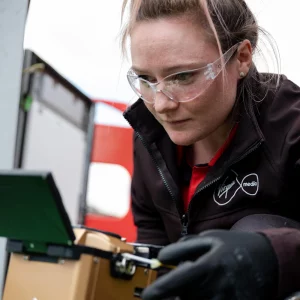Sponsored Links
Virgin Media Business UK Shuns Concern over IPv4 Internet Apocalypse
Posted: 04th Feb, 2011 By: MarkJ
 UK ISP Virgin Media Business has today shunned fears that the internet is under capacity and that the new IPv6 addresses are not ready for mass adoption. The comments relate directly to this week's news that IANA had finally distributed its last remaining IPv4 internet addresses to the five world regional registries.
UK ISP Virgin Media Business has today shunned fears that the internet is under capacity and that the new IPv6 addresses are not ready for mass adoption. The comments relate directly to this week's news that IANA had finally distributed its last remaining IPv4 internet addresses to the five world regional registries.Shortly after that announcement the Number Resource Organization (NRO) promptly predicted that the remaining IPv4 addresses could all be goggled up within the space of a "few weeks to many months". UK ISPs also contacted us to echo their fears, not least about the lack of consumer IPv6 capable broadband routers (here).
Despite these concerns, which could conceivably lead to some connectivity and or performance problems if not addressed by ISPs and manufacturers alike, Virgin has urged firms to stay calm and advised that there is no immediate need for panic.
The Head of Applications and Services at Virgin Media Business, Matt McCloskey, told ISPreview.co.uk:
"It’s important that both businesses and the public realise, that despite recent reports, the ‘IPcalypse’ is not nigh and the internet isn’t about to topple over. The media furore isn’t helpful and my concern is that it’s going to lead to bulk buying of the final IPv4 addresses - a bit like stocking up on groceries before a major storm hits and clearing your local supermarket out of tinned goods. Even with the recent speculation surrounding IPv4 addresses running out, we have yet to see real customer demand for IPv6.
We are advising UK businesses not to panic. They will not suddenly be ‘switched off’ if they stay on IPv4, nor will the new addresses create an ‘old’ and ‘new’ Internet experience. Like Y2K, the impact of IPv6 has been widely exaggerated. The great thing about the Internet is that its capacity is infinite and businesses should rest assured that the infrastructure is in place to support a smooth transition between IPv4 and IPv6. However, of course, we would always recommend the efficient use of IP addresses."
"It’s important that both businesses and the public realise, that despite recent reports, the ‘IPcalypse’ is not nigh and the internet isn’t about to topple over. The media furore isn’t helpful and my concern is that it’s going to lead to bulk buying of the final IPv4 addresses - a bit like stocking up on groceries before a major storm hits and clearing your local supermarket out of tinned goods. Even with the recent speculation surrounding IPv4 addresses running out, we have yet to see real customer demand for IPv6.
We are advising UK businesses not to panic. They will not suddenly be ‘switched off’ if they stay on IPv4, nor will the new addresses create an ‘old’ and ‘new’ Internet experience. Like Y2K, the impact of IPv6 has been widely exaggerated. The great thing about the Internet is that its capacity is infinite and businesses should rest assured that the infrastructure is in place to support a smooth transition between IPv4 and IPv6. However, of course, we would always recommend the efficient use of IP addresses."
The issue of "customer demand" is an interesting one that needs to be explored because, generally speaking, few will feel a need to request IPv6 until IPv4 is no longer available. However, ISPs must still be ready for when that inevitable day comes, which could be sooner than expected; if you believe the NRO. Some even suggest that having to request IPv6 in the first place is almost sign of failure because it should be there regardless.
The IPv6 support issues will have less of an impact upon businesses because IPv6 capable hardware is already available. By contrast the vast majority of consumers would have no reason to request IPv6 as they never regarded it as a "feature". It's just a seamless part of the internet, one they never have to see and probably do not even know exists. Nobody should have to "demand" that their shiny new car comes with wheels; you expect it to work, much like IPv6 Readiness.
Indeed if ISPs do their job right than the transition from one platform to the other should remain relatively seamless. If any problems do occur then it will only affect those with the very oldest hardware and software. In either case it looks like we won't have to wait too long before finding out whether or not ISPs are prepared.
Search ISP News
Search ISP Listings
Search ISP Reviews
Latest UK ISP News








Cheap BIG ISPs for 100Mbps+
150,000+ Customers | View More ISPs
Cheapest ISPs for 100Mbps+
Modest Availability | View More ISPs
Latest UK ISP News
Helpful ISP Guides and Tips
Sponsored Links
The Top 15 Category Tags
- FTTP (6802)
- BT (3882)
- Politics (3076)
- Business (2767)
- Openreach (2663)
- Building Digital UK (2513)
- Mobile Broadband (2476)
- FTTC (2142)
- Statistics (2130)
- 4G (2093)
- Virgin Media (2026)
- Ofcom Regulation (1780)
- 5G (1733)
- Fibre Optic (1604)
- Wireless Internet (1595)
Sponsored
Copyright © 1999 to Present - ISPreview.co.uk - All Rights Reserved - Terms , Privacy and Cookie Policy , Links , Website Rules






























